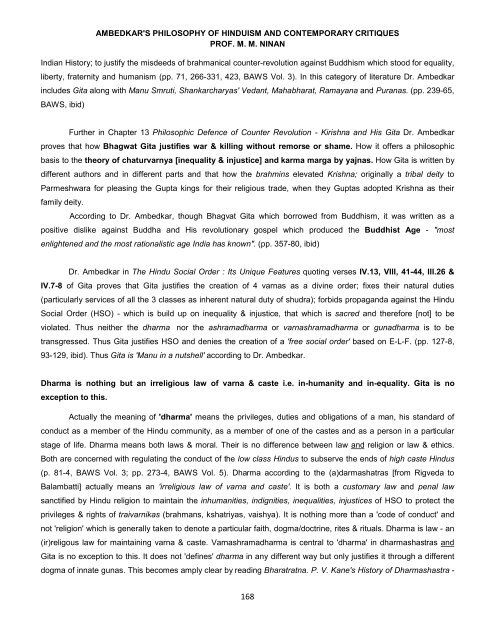Ambedkar-Philosophy of Hinduism
You also want an ePaper? Increase the reach of your titles
YUMPU automatically turns print PDFs into web optimized ePapers that Google loves.
AMBEDKAR'S PHILOSOPHY OF HINDUISM AND CONTEMPORARY CRITIQUES<br />
PROF. M. M. NINAN<br />
Indian History; to justify the misdeeds <strong>of</strong> brahmanical counter-revolution against Buddhism which stood for equality,<br />
liberty, fraternity and humanism (pp. 71, 266-331, 423, BAWS Vol. 3). In this category <strong>of</strong> literature Dr. <strong>Ambedkar</strong><br />
includes Gita along with Manu Smruti, Shankarcharyas' Vedant, Mahabharat, Ramayana and Puranas. (pp. 239-65,<br />
BAWS, ibid)<br />
Further in Chapter 13 Philosophic Defence <strong>of</strong> Counter Revolution - Kirishna and His Gita Dr. <strong>Ambedkar</strong><br />
proves that how Bhagwat Gita justifies war & killing without remorse or shame. How it <strong>of</strong>fers a philosophic<br />
basis to the theory <strong>of</strong> chaturvarnya [inequality & injustice] and karma marga by yajnas. How Gita is written by<br />
different authors and in different parts and that how the brahmins elevated Krishna; originally a tribal deity to<br />
Parmeshwara for pleasing the Gupta kings for their religious trade, when they Guptas adopted Krishna as their<br />
family deity.<br />
According to Dr. <strong>Ambedkar</strong>, though Bhagvat Gita which borrowed from Buddhism, it was written as a<br />
positive dislike against Buddha and His revolutionary gospel which produced the Buddhist Age - "most<br />
enlightened and the most rationalistic age India has known". (pp. 357-80, ibid)<br />
Dr. <strong>Ambedkar</strong> in The Hindu Social Order : Its Unique Features quoting verses IV.13, VIII, 41-44, III.26 &<br />
IV.7-8 <strong>of</strong> Gita proves that Gita justifies the creation <strong>of</strong> 4 varnas as a divine order; fixes their natural duties<br />
(particularly services <strong>of</strong> all the 3 classes as inherent natural duty <strong>of</strong> shudra); forbids propaganda against the Hindu<br />
Social Order (HSO) - which is build up on inequality & injustice, that which is sacred and therefore [not] to be<br />
violated. Thus neither the dharma nor the ashramadharma or varnashramadharma or gunadharma is to be<br />
transgressed. Thus Gita justifies HSO and denies the creation <strong>of</strong> a 'free social order' based on E-L-F. (pp. 127-8,<br />
93-129, ibid). Thus Gita is 'Manu in a nutshell' according to Dr. <strong>Ambedkar</strong>.<br />
Dharma is nothing but an irreligious law <strong>of</strong> varna & caste i.e. in-humanity and in-equality. Gita is no<br />
exception to this.<br />
Actually the meaning <strong>of</strong> 'dharma' means the privileges, duties and obligations <strong>of</strong> a man, his standard <strong>of</strong><br />
conduct as a member <strong>of</strong> the Hindu community, as a member <strong>of</strong> one <strong>of</strong> the castes and as a person in a particular<br />
stage <strong>of</strong> life. Dharma means both laws & moral. Their is no difference between law and religion or law & ethics.<br />
Both are concerned with regulating the conduct <strong>of</strong> the low class Hindus to subserve the ends <strong>of</strong> high caste Hindus<br />
(p. 81-4, BAWS Vol. 3; pp. 273-4, BAWS Vol. 5). Dharma according to the (a)darmashatras [from Rigveda to<br />
Balambatti] actually means an 'irreligious law <strong>of</strong> varna and caste'. It is both a customary law and penal law<br />
sanctified by Hindu religion to maintain the inhumanities, indignities, inequalities, injustices <strong>of</strong> HSO to protect the<br />
privileges & rights <strong>of</strong> traivarnikas (brahmans, kshatriyas, vaishya). It is nothing more than a 'code <strong>of</strong> conduct' and<br />
not 'religion' which is generally taken to denote a particular faith, dogma/doctrine, rites & rituals. Dharma is law - an<br />
(ir)religous law for maintaining varna & caste. Varnashramadharma is central to 'dharma' in dharmashastras and<br />
Gita is no exception to this. It does not 'defines' dharma in any different way but only justifies it through a different<br />
dogma <strong>of</strong> innate gunas. This becomes amply clear by reading Bharatratna. P. V. Kane's History <strong>of</strong> Dharmashastra -<br />
168


















